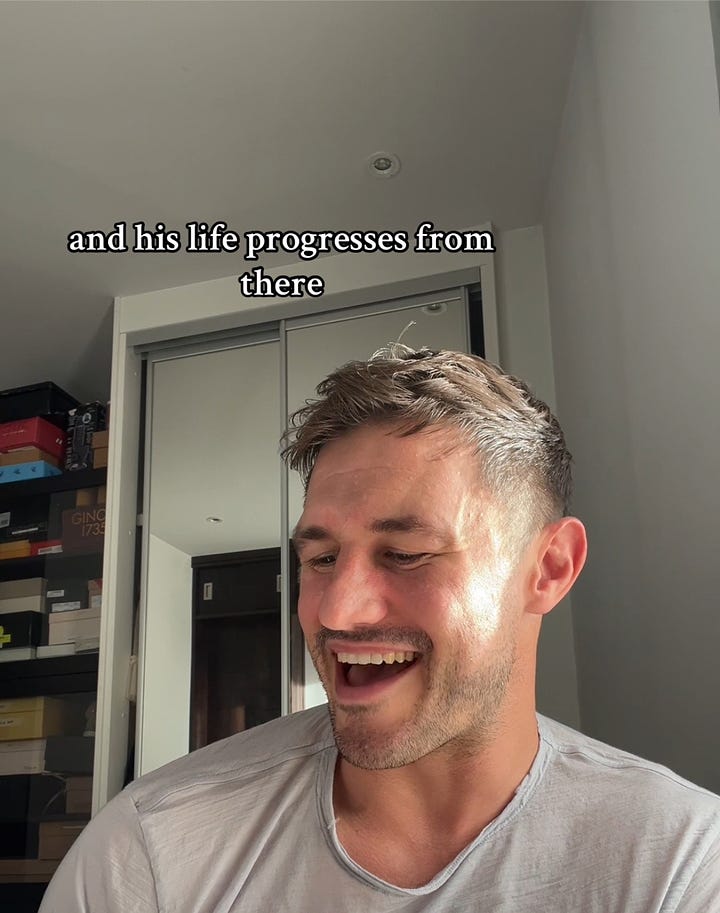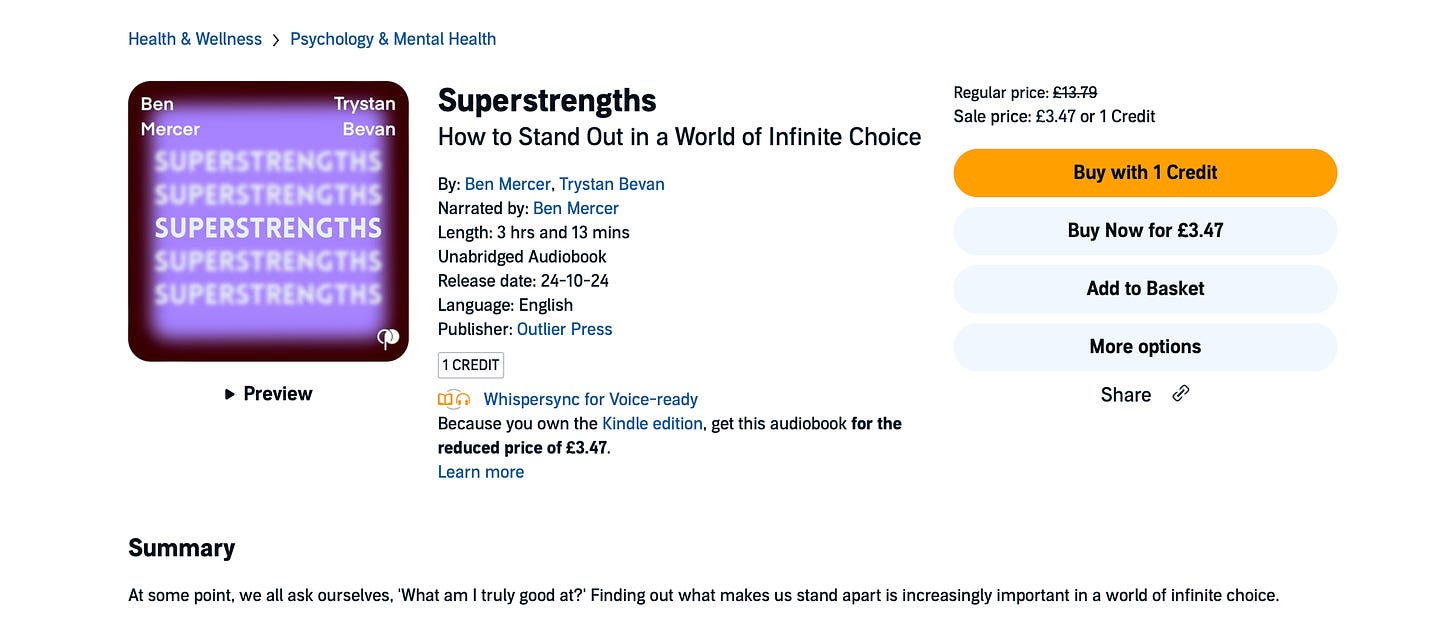hello,
Paid subscribers received the riveting tale of how I spent 8 hours on the M5 Motorway last Friday, with extra reading recommendations.
I was down in Devon for a wedding and aside from the festivities for an old friend, I had the most experience on the beach, seeing the sky reflected in the the film of water left on the sand as the tide retreated. The photo was picked up by Substack’s roundup which was a nice surprise and I’ve been really enjoying sharing images over here, more so than on Instagram for some reason. Here’s a very blue version of the beach shot while alongside, I was amused by the captions captured while I was waffling on about things. They relate to Any Human Heart but feel appropriate for this letter too.


I’ve left the audio version open to all this week and if you fancy supporting the letter, consider a paid subscription! There will be more audio coming down the pipe in future.
the books📖
It’s a long one this week so I won’t keep you here beyond saying that,
Superstrengths is now out on audiobook! (click here to buy)
Narration is something I’d like to do more of so while I turn my attention to figuring that one out, you can all listen to this one I did earlier and I’ve just realised that if you buy the £0.99 Kindle edition, you can get the audiobook at a reduced price. Thanks Bezos.
for your interest
boys and books (2), full of ideas and rivals
boys and books (2)
Last week’s letter shared a few of the results from the first year of the boys’ literacy project and this week, I’ve received a bit of a breakdown of some of the other data from our work. It’s very cool and here it is:
Behaviour significantly improved last academic year
Boys received fewer sanctions with a reduction of 13 fewer negative behaviour events on average.
Improved attendance
Boys are attending school more than any other group, including the girls. This dovetails with last week’s comments on boys seeing an increased value in the lessons, their content and educational interventions.
Disadvantaged boys outperformed non-disadvantaged boys in English
What’s nice about this metric is that it’s not measured by overall grade but by progress over the year. The disadvantaged boys, who were given priority access to the cohort, improved in English more so than the better academic performers who didn’t attend.
In a similar finding, pupils receiving Free School Meals closed the achievement gap in English, with the whole school Gender Gap in English also reducing slightly. Across all subjects, the Gender Gap closed by 1/3, a record improvement at the school.
SEN (Special Educational Needs) Boys had a positive progress of 8 overall as a cohort
This means the special educational needs students have performed in line with national progress expectations for everyone over 8 subjects including English and Maths.
It’s clear that what we’re doing has worked. I’m excited to work on it more broadly and dare I say, it feels quietly revolutionary.
full of ideas
Bill Watterson, the creator of one of my favourite ever things the comic Calvin and Hobbes (read all of them), painted a copy of Michelangelo's Creation of Adam on the ceiling of his college dorm room.
It took him months, it wasn’t particularly good and he had to paint over it at the end of the year. It feels futile.
I’d posit that any creative endeavour feels futile, certainly when it begins and often when it ends. Most people’s creative endeavours are completely ignored but as Watterson said in the commencement speech where he outlined his act of artistic vandalism, he ‘never spent as much time or work on any authorised art project, or any poli sci paper, as I spent on this one act.’
It's surprising how hard we'll work when the work is done just for ourselves.
I’ve worked well in the past when I’ve been obliged to by a sense of professional and communal responsibility but I’ve probably worked best, hardest and longest when it’s just been for myself, doing things like this newsletter which sometimes feel futile. People are very kind about it, some even pay these days, but as Watterson also says,
If you ever want to find out just how uninteresting you really are, get a job where the quality and frequency of your thoughts determine your livelihood.
Despite his daily comic strip bringing him wealth and acclaim, Watterson stopped. The pressure of 365 good ideas per year became too much for him. But before he stopped, he said the trick was to recharge his mind’s batteries like a car; you have to keep them running. You can’t watch the tv or TikTok if you want new ideas to come to you. Ideas come in idle moments, like showering or walking or running, or they come from making things.
I agree with him.
Recently I’ve gone back to messing with a novel draft, adding a few hundred words here and there and while the end result may not be particularly ‘good’, and it will be a very long way from a Michelangelo painting, I’ve noticed how much more generative my mind is when I’ve got this separate, obligation-free output. Suddenly I’m full of ideas.
rivals
I’m yet to see the Jilly Cooper series but it’s amusing to me that after speaking about enemies the other week, I finally get around to reading one of my open tabs that it turns out, touches on exactly this topic.
Messi and Ronaldo is the archetypal modern sporting rivalry, the two greats who pushed each other to higher and higher heights for longer than anyone else has sustained, so I was fascinated to find a similar battle enacted not only in another sphere, in the art room, but between two teenage girls.
In this article on the subject of the muse, the sort of nonfiction piece Zadie Smith does so well, we learn how the painter Celia Paul, whose artistic career is often ascribed to the influence of Lucian Freud, attributes a lot of her eventual success to being locked in an intense rivalry with a girl at her boarding school called Linda. According to Smith,
Their relationship was nonsexual, urgently creative, extremely competitive, and centred around the art room of their school, to which both girls had been given a key by their art teacher. Each worked secretly, separately, late at night, inspired by envy of the work left behind by the other.
For her part, Paul found Linda’s drawings astonishing, inspiring such jealousy in her she ‘thought I was going to pass out’. Linda’s work made her want to do better, to practise harder and they match each other picture for picture, like boxers going blow for blow, until the school holidays. Paul spends her summer toiling over her canvases, returning for the autumn term in September with a huge amount of work and when it turns out Linda has only half-completed one pencil drawing in riposte, it becomes clear Paul has won. She heads for the Slade School of Fine Art, Linda for sixth form college.
Paul did the work for herself, spurred on by her rivalry, but on second or third thought, I considered the role of the teacher. They didn’t really do anything beyond giving Paul and Linda the keys and let them run away with their imaginations. All they really did was recognise a desire in the two young girls and give them the means to express it. As the professor who immediately approved Paul’s place at art school said to her father by way of convincing him to let Paul attend the Slade,
Pictures unpainted make the heart sick.
a book
As told to the paid subscribers, I’ve been romping my way through the later books of the Red Rising series. The fourth Iron Gold was pretty good while I’m really enjoying the fifth, Dark Age.
The books begin as a hyperviolent, more adult Hunger Games, progressing to a full on space-hopping saga and while it’s very untaxing, it does do a couple of things very well. The first book is bound by the format of the Games but unlike the hungry version, it expands its world beyond those horizons very effectively.
Then there’s the action, which although very violent, is extremely well-described. Despite the anti-gravity or the spacemarine scenes, you’re never in any doubt as to the movements of the characters. The books are remarkably spatially aware and while they are not going to be the best books you ever read, they are excellent low consequence fun.
a listen
While I’ve only seen the one film by him, Grizzly Man, I couldn’t resist Werner Herzog’s memoir Every Man for Himself and God against All which, due to his weirdness and mesmerising voice, is great on audiobook.
a quote
I reread the books of youth with the gravity of age.
– Iron Gold
lastly
Thanks for reading! My work is made possible by you so if you’d like to support me you can buy my books, hire me to do something or you can become a paid subscriber using the button below.
If you want to help me out for free, you can share this letter with someone who might enjoy it, either on social media or by directly sending it to them using the button.
I’ll see you next time.





